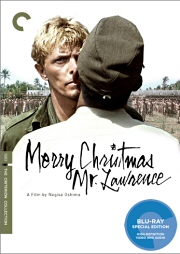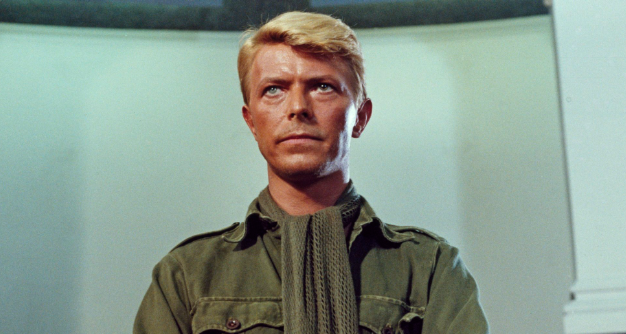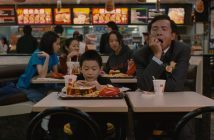 “Merry Christmas Mr. Lawrence” is a real curiosity piece, as well as something of a minor holy grail for film buffs in the U.S. Probably the last time it was available here in the States was in the late 80s or early 90s on VHS. Thanks to the fine folks at Criterion, that’s no longer the case. Like many people, I became familiar with it due to its soundtrack, which wasn’t quite as difficult to find, at least if you knew where to look. That music was composed by one of the film’s stars, Ryuichi Sakamoto, and the title track remains one of the greatest single pieces of music in film history. So transcendent is it that it’s managed to take on a life of its own, and has been remixed, rearranged and covered by at least a dozen artists, many in the past decade. Sakamoto admits that there was a lengthy period of time in which he learned to hate the tune, as it overshadowed nearly everything else he’d created in his long career. And it is probably a better piece of art than the film itself, but that’s really an apples and oranges kind of thing, so it’d be best to not go there.
“Merry Christmas Mr. Lawrence” is a real curiosity piece, as well as something of a minor holy grail for film buffs in the U.S. Probably the last time it was available here in the States was in the late 80s or early 90s on VHS. Thanks to the fine folks at Criterion, that’s no longer the case. Like many people, I became familiar with it due to its soundtrack, which wasn’t quite as difficult to find, at least if you knew where to look. That music was composed by one of the film’s stars, Ryuichi Sakamoto, and the title track remains one of the greatest single pieces of music in film history. So transcendent is it that it’s managed to take on a life of its own, and has been remixed, rearranged and covered by at least a dozen artists, many in the past decade. Sakamoto admits that there was a lengthy period of time in which he learned to hate the tune, as it overshadowed nearly everything else he’d created in his long career. And it is probably a better piece of art than the film itself, but that’s really an apples and oranges kind of thing, so it’d be best to not go there.
The movie takes place is a Japanese POW camp during World War II and primarily concerns four very different men: two Japanese warders from the East and two British prisoners from the West. The first pair we meet are Colonel Lawrence (Tom Conti) and Sergeant Hara (Takeshi Kitano), who have an unusual kinship. They frequently sit and engage in civilized discourse, while in other moments Hara seems to take great pleasure in beating the shit out of Lawrence for insubordination. It never fazes Lawrence, and he typically picks himself up after a beating and goes on about the business of trying to explain his perception of the differences between their two cultures to Hara.
The dramatic thrust of the film, however, exists somewhere in the lack of communication between Major Jack Celliers (David Bowie) and Captain Yonoi (Sakamoto), the camp commandant. From the first moment Yonoi lays eyes on Celliers, he is transfixed, and from that moment onward he makes Celliers his pet project, but to what end is unclear. Both men suffer from serious cases of regret, and yet they’re never able to explain to one another what they have in common. Celliers quickly becomes a disruptive force, while Yonoi tries to find new methods of keeping him down, while also building him up. It’s a movie relationship that practically defies a cogent description, because it’ll mean something different to each viewer.
 “Merry Christmas Mr. Lawrence” is a complex film, and it’s just as important to listen to what’s not being said in addition to what is. The fixation Yonoi has on Celliers is clearly homosexual in nature (hey, it’s Bowie circa ’83 – can you blame the guy?), and yet the character is so repressed by his culture (not to mention the times) that he would never dare express that side of himself, so instead he finds other ways of getting his point across. It would be unfair to call the film a gay movie, because its messages are too dense for such a simplistic label, just as referring to it as a POW film does it a disservice. There’s no question the film is unique. I’ve certainly never seen anything quite like it. It’s a fascinating marriage of East meets West, especially when one considers that it was helmed by a Japanese director (Nagisa Oshima) and based on a pair of novels by a South African who spent much of his life in England (Laurens van der Post). Further, the screenplay was a collaboration between the director and Brit Paul Mayersberg.
“Merry Christmas Mr. Lawrence” is a complex film, and it’s just as important to listen to what’s not being said in addition to what is. The fixation Yonoi has on Celliers is clearly homosexual in nature (hey, it’s Bowie circa ’83 – can you blame the guy?), and yet the character is so repressed by his culture (not to mention the times) that he would never dare express that side of himself, so instead he finds other ways of getting his point across. It would be unfair to call the film a gay movie, because its messages are too dense for such a simplistic label, just as referring to it as a POW film does it a disservice. There’s no question the film is unique. I’ve certainly never seen anything quite like it. It’s a fascinating marriage of East meets West, especially when one considers that it was helmed by a Japanese director (Nagisa Oshima) and based on a pair of novels by a South African who spent much of his life in England (Laurens van der Post). Further, the screenplay was a collaboration between the director and Brit Paul Mayersberg.
As stimulating as its ideas may be, where “Merry Christmas Mr. Lawrence” falters is in the casting department. Bowie can be a convincing presence when he’s playing an alien, a vampire or the Goblin King, but it’s a little hard to buy him as the WWII hero he’s supposed to be here, and he never really sells the part. On top of that, there’s Sakamoto, who’s nothing less than wooden throughout the entire picture. He’d never acted before, and admits to being surprised when Oshima approached him for the part. As novel as it may have been in ’83 to cast two incredibly famous rock stars in these pivotal roles, it’s ultimately a decision that hurts the film, especially since so much of it depends on a great deal of silence from both men. One wonders what could have been if Celliers and Yonoi had been played by actors who really knew their stuff.
Interestingly, the one condition Sakamoto made to Oshima was that if he took the part, he’d be allowed to write the film score, as it was also something he’d never done before; the director agreed without thinking twice. There’s nothing on earth that would make me want to trade Sakamoto’s score, so at least that half of the deal worked out. Well, sort of. As great as the music is in “Merry Christmas Mr. Lawrence,” much of it doesn’t really fit the picture and it’s frequently rather obtrusive. Sakamoto (who would go on to score movies for the likes of Bernardo Bertolucci and Brian De Palma) pretty much cops to that truth in the extras, and he certainly doesn’t defend his acting. Indeed, his interviews on this disc are amazing video fodder and his insights into the making of the film are invaluable.
But all is not entirely lost, because Tom Conti and Takeshi Kitano are always waiting around the corner to rivet the viewer with excellent performances. Oddly, this was an early film for both of these men as well, but you wouldn’t know it based on their work here. Conti is so wonderful, I kept thinking while watching him, “Why does nobody use this guy anymore?” Man, what a talent. Likewise, Kitano, who would go on to wear just about every artistic hat imaginable, brings an immense amount of credibility through his portrayal of probably the most intense, engaging character in the film. He’s also the guy who gets to say the last line of dialogue, which just so happens to be the movie’s title.
There’s a great deal of joy and humanity placed right next to the brutality and pain in “Merry Christmas Mr. Lawrence.” It’s not going to be for everyone (and if you don’t care for subtitles, half of the film’s in Japanese), but there’s definitely an audience for it out there somewhere. Good on Criterion for finally letting us decide for ourselves whether or not we’re one of them.
3.5 / 5 Stars
Starring: David Bowie, Tom Conti, Ryuichi Sakamoto, Takeshi Kitano
Director: Nagisa Oshima
Reviewed by Ross Ruediger
Theatrical Release Date: August 26, 1983
Single-Disc Blu-Ray Review:
It’s Criterion, so of course the picture and sound is really nice, although don’t expect it to look or sound like a movie from today. This is an artsy 80s movie, no doubt, and if you’d walked into a movie auditorium in ’83, this is almost exactly what the experience would’ve been like. Curiously, there’s no commentary track, but once you sift through the extras, you won’t miss that omission. “The Oshima Gang” is a 30-minute vintage featurette from ’83 on the making of the movie. Three lengthy interview pieces recorded this year feature screenwriter Paul Mayersberg, producer Jeremy Thomas, as well as Conti and the aforementioned Sakamoto. (Nope, Bowie is nowhere to be seen, other than in the ’83 making-of.) “Hasten Slowly” is an hour-long doc from 1996 on Laurens van der Post. There’s also the film’s trailer, and the usual gorgeous Criterion booklet (28 pages) featuring essays and interviews about the film. This disc might even make a fine Christmas gift for the right kind of film buff, especially if his name happens to be Lawrence.


